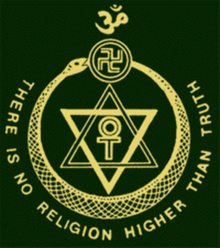
Back Theosophie ALS ثيوصوفية Arabic Teosofiya Azerbaijani Тэасофія Byelorussian Теософия Bulgarian দিব্যজ্ঞান Bengali/Bangla Teosofia Catalan Teosofie Czech Theosoffi Welsh Teosofi Danish

Theosophy is a religious and philosophical system established in the United States in the late 19th century. Founded primarily by Russian mystic and spiritualist Helena Blavatsky, and based largely on her writings, it draws heavily from both older European philosophies such as Gnosticism and Neoplatonism and Indian religions such as Hinduism and Buddhism. Although many adherents maintain that Theosophy is not a religion, it is variably categorized by religious scholars as both a new religious movement and a form occultism from within Western esotericism.
As presented by Blavatsky, Theosophy teaches that there is an ancient and secretive brotherhood of spiritual adepts known as the Masters, who are found around the world but primarily centered in Tibet. These Masters are alleged by Blavatsky to have cultivated great wisdom and supernatural powers, and Theosophists believe they initiated the modern Theosophical movement through disseminating their teachings via Blavatsky. Theosophists believe that these Masters are attempting to revive knowledge of an ancient religion once found around the world that will again come to eclipse existing world religions. Theosophy holds a monist position that there exists a single divine Absolute and articulates an emanationist cosmology in which the universe is perceived as outward reflections from this Absolute. The purpose of human life is spiritual emancipation and the human soul undergoes reincarnation upon bodily death according to a process of karma. Universal brotherhood and social improvement are guiding principles, although there is no particular ethical framework.
Theosophy was established in New York City in 1875 with the founding of the Theosophical Society by Blavatsky and Americans Henry Olcott and William Quan Judge. In the early 1880s, Blavatsky and Olcott relocated to India, where they established the Society's headquarters at Adyar, Tamil Nadu. Blavatsky described her ideas in two books, Isis Unveiled and The Secret Doctrine, which became key texts within Theosophy. Following her death in 1891, there was a schism in the Society, with Judge leading the Theosophical Society in America (TSA) to split from the international organization. Under Judge's successor Katherine Tingley, a Theosophical community named Lomaland was established in San Diego, California. At its height in 1895, there were 102 American branches with nearly 6,000 members. The Adyar-based Society was later taken over by Annie Besant, under whom it grew to its largest extent during the late 1920s, before going into decline after the Great Depression. TSA has since been reincorporated as a national section of the global Theosophical Society, which has a global membership of roughly 26,606 across 70 countries, including over 3,550 in the United States.
Building upon Blavatsky's ideals, modern Theosophy emphasizes mystical experience and holds that there is a deeper spiritual reality that can be reached through intuition, meditation, revelation, or some form of transcending normal human consciousness. Theosophists also maintain an esoteric doctrine that all world religions contain a universal inner teaching that must be deciphered, and that knowledge of this divine wisdom gives access to the mysteries of nature and humankind’s inner essence. To that end, different religious and philosophical traditions, as well as unexplained phenomena and other supernatural occurrences, are to be studied and investigated; Theosophy allows adherents to profess any or no religion, and it is sometimes described as pantheistic in nature.[1] Theosophical groups maintain that Theosophy is not a religion but instead aspires to relate to an ultimate truth that may be gleaned from other religions, variably called "Divine Wisdom", “Wisdom Tradition”, and the “Perennial Philosophy".[2]
Theosophy played a significant role in bringing knowledge of Eastern religions to the West and encouraging cultural pride in South Asia. Many prominent artists and writers have also been influenced by Theosophical teachings. Theosophy has an international following, and during the 20th century had tens of thousands of adherents. Theosophical ideas have also inspired over 100 esoteric movements and philosophies, among them Anthroposophy, the Church Universal and Triumphant, and the New Age.
- ^ "Helena Blavatsky | Russian Occultist, Theosophist | Britannica". www.britannica.com. Retrieved 2024-07-06.
- ^ Porzelt, Beverly. "FAQ". Theosophical Society in America. Retrieved 2024-07-06.
© MMXXIII Rich X Search. We shall prevail. All rights reserved. Rich X Search